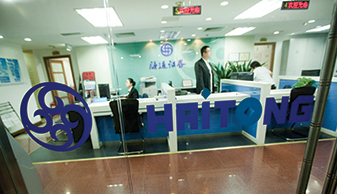The sale of Portugal's BESI, Novo Banco’s investment banking arm – which has since rebranded as Haitong Bank – to Haitong Securities in September 2015 marked two trends: the meteoric rise of China’s outward direct investment (ODI), which is set to outpace foreign direct investment in the country, and the increasing sophistication of China’s offshore investment.
Haitong Securities not only completed an acquisition in the financial services sector, marking a move away from the typical extractives or real estate sectors, it also bought an asset in one of the countries hit hardest during the eurozone sovereign crisis of 2010.
In a new world order where the West, hit by both a financial and a sovereign debt crisis in the space of three years, no longer dominates global markets, Chinese investors are standing out for their financial muscle and bullishness.
BESI, however, was not an obvious investment. Its parent, Novo Banco, was created from Banco Espírito Santo’s (BES's) healthy assets when it was split into ‘good’ and ‘bad’ banks following a €4.9bn bailout by Portugal’s bank resolution fund in 2014. The lender got caught in the storm again at the end of 2015, when the Bank of Portugal decided to transfer €2bn of Novo Banco senior bonds to the ‘bad bank’, inflicting losses on large international and institutional investors. This decision remains controversial since it came 18 months after the central bank had finalised the asset split between the bad and good banks.
Wholly owned by the bank resolution fund, Novo Banco was itself for sale. Chinese buyers – Anbang Insurance and Fosun International – were once again at the heart of negotiations before the Bank of Portugal called off the sale in September 2015. It put Novo Banco back on the market in mid-January.
Editor's choice
Betting on Portugal
Despite the rocky past of the Portuguese banking sector and wider economy, Haitong remained unfazed during the BESI deal. “We didn’t believe the Iberian economies were going to get worse. They have already bottomed out and the peninsular is recovering slowly but steadily. We saw strong recovery momentum in Spain and Portugal in 2015,” says Hiroki Miyazato, Haitong Bank's chairman.
Indeed, strong external demand, a weaker euro and lower oil prices have propped up Portugal’s gross domestic product growth, which rose from 0.9% in 2014 to 1.7% in 2015. But recovery remains fragile. Youth unemployment is still high – 34.7% in 2014 – and investment is not picking up as fast as in other EU countries. More structural reforms are needed, say analysts.
But buying up assets in a distressed market can still make a lot of economic sense. “We were lucky. Market volatility in Europe meant we could acquire a good asset from Novo Banco at a very good price. Our investment had good timing,” says Mr Miyazato.
London darling
As Chinese ODI continues growing, this acquisition will enable Haitong to provide its Chinese clients with investment opportunities in Europe and will help BESI offer its former, yield-hungry European clients investment products linked to China. London will be the hub facilitating these links.
“Our analysts now have the obligation to look into ways of generating value-added for European investors through the China angle. We will focus more on securities that are either totally or partially China-linked,” says Luis Luna Vaz, Haitong Bank's UK chief executive.
London is key to the internationalisation of the renminbi – as an offshore renminbi clearing centre, London is only second to Singapore in terms of renminbi payment flows. According to Swift, more than 50% of renminbi foreign exchange trading outside China and Hong Kong is done with the UK.
Haitong Securities wants to capture this growing trend. “Morgan Stanley, Goldman Sachs and Daiwa established operations in London [in the 1980s and 1990s] as the dollar and yen started trading in London. Now we see a new trend of offshore renminbi trading in London so Haitong can hopefully develop in a similar way,” says Mr Miyazato.
And although Chinese issuers listing bonds or equities in London still prefer local currencies (euros or sterling), Mr Miyazato is confident that they will start looking into dual-currency products and ultimately purely renminbi offerings soon.
Allowing these offshore bonds or equities to be traded in mainland China would develop the market further. “When I was working for Credit Suisse in London in the 1990s, Japanese issuers were offering euro-yen products here... and bringing the products back to Japan to trade locally. One day this will also happen in China. It would turn the products into a truly global offering,” says Mr Miyazato.
Renminbi jitters
Mr Miyazato’s bullish renminbi predictions are notwithstanding the volatility in the currency and in China’s local financial markets over the past seven months.
China’s onshore stock market lost more than one-third of its value in July 2015. A month later, the Chinese government devalued the renminbi and announced that the currency’s fixing would be based on how the renminbi closed in the previous trading session rather than against the US dollar. This regime change caused a split between the onshore and offshore renminbi values, reigniting investor insecurity in early 2016, before the two rates returned to parity in mid-January.
But to Mr Miyazato, this currency movement is just a natural progression in China’s economic development. “Before, you only saw money going into China. Now, money is also going out [there was $120bn in net outflows in 2014]. Because of this divergence and a changing cash flow, the renminbi will start moving both ways. There are now two forces at play,” he says.
He also predicts the renminbi will trade within an even wider band since it joined the International Monetary Fund’s special drawing rights value basket (which takes effect this October), giving it global reserve currency status.
Some market participants argue that the renminbi’s devaluation – which makes offshore deals more expensive – might slow Chinese companies’ international merger and acquisition activity, which Haitong is looking to capture. But Mr Vaz disagrees. “When a corporate decides to expand abroad, it is not because of the currency. We have never seen a company move faster or slower because of a currency movement,” he says.
Brave global expansion
To further capture the renminbi internationalisation story, Haitong wants to use the BESI acquisition to develop its international presence. Haitong also wants international operations’ revenues to account for 30% of overall revenue in the next five years – it is now at 10%.
Pre-deal, BESI had European operations in Portugal, Spain, London and Warsaw. BESI’s Polish franchise used to have a predominantly domestic focus, but now it will be used to break into the Europe, Middle East and Africa region. “I think we can leverage it a bit. The way forward is to expand into neighbouring countries but also to capture opportunities with China, especially now that Russia is being a bit sidelined,” says Mr Vaz.
Haitong also wants to expand further towards the Middle East – namely Turkey and Dubai – to jump on the One Belt, One Road bandwagon. Based on the original Silk Road linking China to Europe, this Chinese government policy is creating new synergies between China and the Middle East and central Asia, which are home to strategic extractives that are in China’s interest.
Elsewhere, Haitong Securities is keen to expand in the African continent to capture commercial links with China. “Africa is one of the most important markets. It is a matter of time before we set up operations there,” says Mr Miyazato. Mozambique and Angola are two preferred destinations. South Africa could also be key as a gateway to Portuguese-speaking markets strongly linked to China. BESI’s Portuguese roots could play to Haitong’s advantage here.
Across the Atlantic, the Chinese lender is looking to grow in Latin America. This is particularly bullish considering most of the region is experiencing political and economic havoc. “China committed a lot of investment in this region... We will help Chinese corporates partner with local players. When people are worried about a market, it is a good time to jump in,” says Mr Miyazato.
Hiring spree
To sustain all of Haitong Securities’ new plans, the firm took on 50 staff last year. Following this first hiring spree, Haitong will be more selective in hiring individuals with experience in Asia-related banking. To BESI, this was also a chance to replenish its teams, post-financial crisis. The growth potential is significant. Haitong Securities chairman Wang Kaiguo announced that London could have more than 500 staff in the future. “We are growing, not shrinking,” says Mr Miyazato.
But there have also been cuts in the name of efficiency. Post-deal, Haitong suggested halving the top management team to six staff.
The new structure of the firm – streamlined into four groups: investment banking, markets, structured and corporate finance and asset management – is also aimed at improving efficiency. Overall, however, the picture for Haitong looks healthy as it embarks upon its global expansion.












